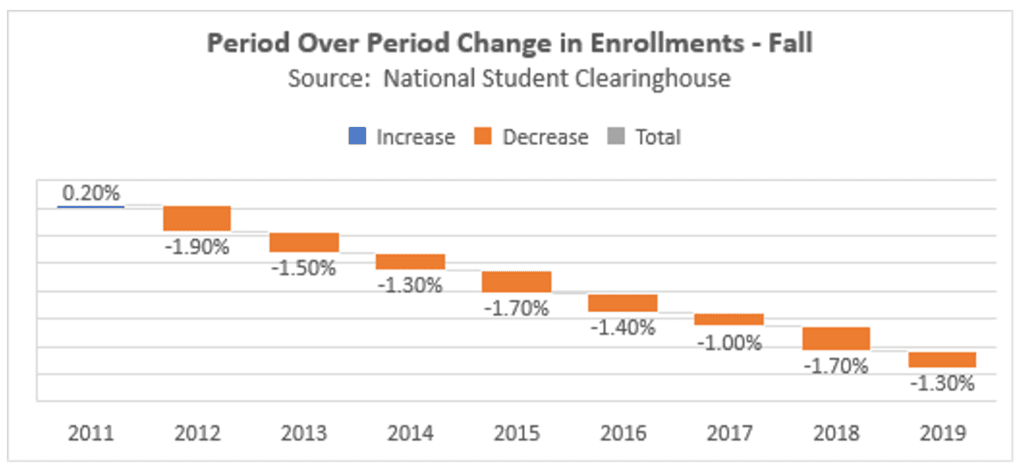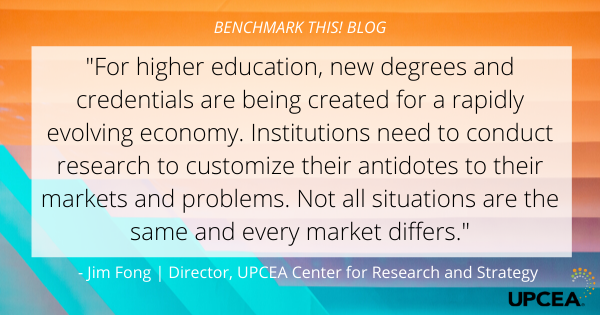Escaping Gilligan’s Island: Lessons for Higher Education
As an older representative of Generation X, just six months shy of being able to say I am a Boomer, I enjoy watching classic television shows such as I Dream of Jeannie, The Brady Bunch or Gilligan’s Island. Many Millennials and certainly most Gen Z’ers are not aware of Gilligan’s Island nor should we expect them to be given their vast selection of viewing choices. For our younger readers, Gilligan’s Island was a late 1960’s sitcom of seven castaways from a ship called the Minnow: the Skipper and his mate, Gilligan; the Professor; millionaire Thurston Howell III and his wife; Ginger, a move star; and country girl Mary Anne[i]. There are many lessons that higher education can learn from Gilligan’s Island.
1. The Professor was Often the Bearer of Bad News. He often addressed the health situation of the castaways or that a volcano was soon to blow up the island. For higher education in this case, the professor is the National Student Clearinghouse, telling us that higher education enrollments have declined again[ii] (see Figure 1), falling from 18.2 million in 2018 to 17.9 million in 2019 (1.3%). In 2011, enrollments stood at 20.1 million. Higher education has adapted slowly to worsening conditions despite fairly stable numbers of 18-year-olds and improving high school graduation rates[iii].

Figure 1
2. The Professor Was Usually the One to Analyze the Situation. He would say that Gilligan’s life was on the line, the island was sinking or that the temperature was changing. In this case, our economy is quickly changing. The retail market has moved to the cloud. The sharing economy has begun to mature with Uber, AirBnB and Rover being commonplace. Automation and artificial intelligence are entering our homes and workplaces. The professor, or in this case Emsi, would tell us that many new jobs are emerging, including cloud data engineer, data analytics specialist, cyber defense engineer, content management specialist, visual interaction designer and many more[iv]. In this new economy, Strada Education and UPCEA have identified evolving roles for those with a humanities or liberal arts background[v].
3. The Professor Always Had an Antidote or Good News. With every bad situation, the Professor would identify a solution, often a concoction or device that could save Gilligan’s or the Skipper’s life or stop the island from sinking. For higher education, new degrees and credentials are being created for a rapidly evolving economy. Institutions need to conduct research to customize their antidotes to their markets and problems. Not all situations are the same and every market differs. In the short run, there will be marketing, pricing, and new program or alternative credentialing solutions. One antidote could be the program or credential. As part of UPCEA’s Hallmarks of Excellence initiative, a recent survey (sponsored by MindEdge) showed[vi]:
a. About two-thirds of UPCEA’s membership offer a form of credential beyond the typical college degree. Of those that did not offer a form of alternative credentialing, most said that they planned to soon.
b. Of this group, just under one in five (19%) said that this credential replaces a typical college degree. Seventy-nine percent said that the credential would supplement a degree.
Alternative credentials could serve a major role in a new economy, helping to supplement existing credentials or as a full credential for a quickly changing job market.
4. Partnerships are Important. The Howells often colluded together. Gilligan and the Skipper and Ginger with Mary Ann, despite their differences, often worked together. Ginger often donned a lab coat and glasses and worked with the Professor on a number of experiments. In a rapidly changing economy, higher education needs greater corporate and employer input and vice versa, although one might argue that the reliance on higher education has become less with greater investment in corporate training and MOOCs by employers. Higher education needs to bring employers to the table more proactively in the form of advisory committees, curriculum design and custom programming.

5. A Good Team is Needed to Get Off the Island. The creativity and risk-taking of Gilligan is needed but balanced by the good the decision making and analytics of the Professor. Like the Howells, the financial implications and investments need to be considered, although they had little value on the island. One could argue that Mary Ann was about common sense or values, while Ginger represented outer beauty or appearance. The two could symbolize the core values of the group or the marketing and advertising components of an institution. Despite the Skipper’s experience, he never clearly evolved as the true leader on Gilligan’s Island, and maybe that was the reason the castaways never left the island in the show’s three seasons. Good leadership is critical in a changing economy.
6. Change Your Processes to Improve Your Odds for Success: To be successful, one must be able to have processes that have discipline when needed and flexibility when required. The castaways had little. With every opportunity to escape the island, their ability to respond correctly often resulted in a misunderstanding or calamity of errors. Most recently, UPCEA and InsideTrack conducted a survey with current online students and staff at 25 institutions. They found that there was significant variability across many factors regarding student and staff expectations or assumptions, as well as communication preferences. The results of that study will be released at the UPCEA SOLA+R and Annual Conferences. Institutions must carefully examine their student- and inquirer-facing processes which may be legacy-based. For example, in 2018, UPCEA analyzed the online “Request for Information” forms of 20 institutions and found most to have significant flaws[vii], such as asking too many questions, questions that were irrelevant or asking questions that were not appropriate for the stage of inquiry.
7. Do Institutions of Higher Education Really Want to Get Off the Island? When the series ended, the castaways were never rescued. Only until the producers made the Rescue from Gilligan’s Island movie did they escape (only to become marooned back on the island later). Some institutions would argue that life is happy and simple on their island, despite the world changing around them. The movie ultimately shows how they escape the island…seeing an urgency of surviving a tsunami. Ironically, it is through technology (a computer disc), that they are able to see the need to escape the island.
Higher education has a wonderful opportunity to become more engaged in a new economy. The creation of new jobs, economies and markets require more functionally-focused and adaptive employees. Employees need new skills and education and the degree is no longer the one shoe that fits.
The old way of doing things keeps you on the island.
[i] Wikipedia
[ii] National Student Clearinghouse Research Center, Fall 2019 Current Term Enrollments, December 16, 2019
[iii] National Center for Education Statistics
[iv] EMSI, Emsi Released New Report: Top 10 Emerging Tech Jobs for 2020, December 17, 2019
[v] https://www.economicmodeling.com/2019/03/20/emsi-at-upcea/
[vi] UPCEA and Mindedge Survey on Alternative Credentials, December 2019
[vii] UPCEA Research conducted for MEMS 2018.
Learn more about UPCEA's expert consultants.
Do you need help with your PCO unit or campus? We can help. Contact UPCEA Research and Consulting for a brief consult. Email [email protected] or call us at 202-659-3130.
Trusted by the nation's top colleges and universities, UPCEA Research and Consulting provides the best value in the industry today. UPCEA's industry experts have years of experience in Online and Professional Continuing education - put them to work for you!
UPCEA Research and Consulting offers a variety of custom research and consulting options through an outcomes-focused pricing model. Find the option(s) that best suit your institution.
Learn more about UPCEA Research & Consulting
The UPCEA Difference
Unmatched Experience: For more than 100 years, UPCEA consultants have exclusively served the needs of online and professional continuing education programs. UPCEA consultants leverage their extensive industry expertise to expedite solutions, anticipate upcoming shifts, and offer distinct best practices, effectively aiding clients in achieving their goals.
Cost Effectiveness: As a nonprofit, member-serving organization, we provide unmatched value, allowing you to maximize limited research and consulting budgets.
Action in Motion: Our cadre of experienced, skilled authorities and expert practitioners propels you forward, translating research and consulting into impactful implementation, a distinctive hallmark of UPCEA. Our team of current and former institutional leaders will support you, turning research and consulting into action.
Mission Alignment: Like you, our mission is to enhance and expand educational opportunities and outcomes for adult and other non-traditional learners. We share your values and work in partnership with you to advance access and excellence in education.
